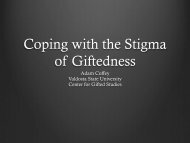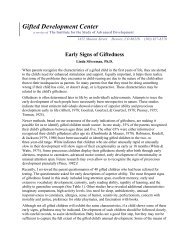- Page 1 and 2: Education of Special Populations of
- Page 3 and 4: Education of Special Populations of
- Page 5 and 6: This is one of five Gifted Endorsem
- Page 7 and 8: This publication was initiated thro
- Page 9 and 10: Special Populations of Gifted Stude
- Page 11 and 12: The course is structured around top
- Page 13 and 14: Resources Evidence of Mastery Learn
- Page 15 and 16: Resources Evidence of Mastery Learn
- Page 17 and 18: Resources Evidence of Mastery Learn
- Page 19 and 20: Resources Evidence of Mastery Learn
- Page 21: Resources Evidence of Mastery Learn
- Page 25 and 26: Resources Evidence of Mastery Learn
- Page 27 and 28: Resources Evidence of Mastery Learn
- Page 29 and 30: Resources Evidence of Mastery Learn
- Page 31 and 32: Resources Evidence of Mastery Learn
- Page 33 and 34: Resources Evidence of Mastery Learn
- Page 35 and 36: Resources Evidence of Mastery Learn
- Page 37 and 38: Resources Evidence of Mastery Learn
- Page 39 and 40: Resources Evidence of Mastery Learn
- Page 41 and 42: Resources Evidence of Mastery Learn
- Page 43 and 44: Resources Evidence of Mastery Learn
- Page 45 and 46: Resources Evidence of Mastery Learn
- Page 47 and 48: Resources Evidence of Mastery Learn
- Page 49 and 50: Evaluation of Effective Programs fo
- Page 51 and 52: Pre- and Post-test Questions for Sp
- Page 53 and 54: Special Populations of Gifted Stude
- Page 55 and 56: Special Populations of Gifted Stude
- Page 57 and 58: Pre- and Post-test Answers for Spec
- Page 59 and 60: Special Populations: Community Issu
- Page 61 and 62: Learning Options and Activities:
- Page 63 and 64: Diversity Focus in the NAGC-CEC Tea
- Page 65 and 66: Standard 7. Instructional Planning
- Page 67 and 68: Goals & Rationale Needs Equity Exce
- Page 69 and 70: Figure B: Secondary and Tertiary Ci
- Page 71 and 72: Special Populations Topic 2 TOPIC 2
- Page 73 and 74:
• Baldwin, A. Y., & Vialle, W. (1
- Page 75 and 76:
At the end of the day when school w
- Page 77 and 78:
To locate gifted kids, most schools
- Page 79 and 80:
• Is fluid—uses assessment proc
- Page 81 and 82:
to persist in gifted education prog
- Page 83 and 84:
Famous People with Disabilities ERI
- Page 85 and 86:
FAMOUS PEOPLE WHO ARE DYSLEXIC, con
- Page 87 and 88:
FAMOUS PEOPLE WITH MOVEMENT DIFFERE
- Page 89 and 90:
Gifted Children with Disabilities S
- Page 91 and 92:
look beyond the hearing efficiency
- Page 93 and 94:
unaware of the differences between
- Page 95 and 96:
SPECIAL NEEDS LANGUAGE RELIGION LAN
- Page 97 and 98:
• Retrieve and review the article
- Page 99 and 100:
6A-6.03313 Procedural Safeguards fo
- Page 101 and 102:
hearing authorized under subsection
- Page 103 and 104:
. An administrative law judge may b
- Page 105 and 106:
6A-6.03019 Special Instructional Pr
- Page 107 and 108:
Special Populations Topic 3 HO 4 Pr
- Page 109 and 110:
Series 9406. (EDRS No. ED388012) Re
- Page 111 and 112:
• Baldwin, A. J., & Vialle, W. (1
- Page 113 and 114:
explore the Internet to see where A
- Page 115 and 116:
students who could benefit from the
- Page 117 and 118:
students to practice their belief b
- Page 119 and 120:
Immigrant children can be easily ma
- Page 121 and 122:
Hispanic Gifted Students According
- Page 123 and 124:
Native American Gifted Although the
- Page 125 and 126:
Like other ethnic groups, there is
- Page 127 and 128:
Other Ethnic Groups Who Are Gifted
- Page 129 and 130:
Identifying and Serving Recent Immi
- Page 131 and 132:
Economic 1. Consider aspirations of
- Page 133 and 134:
Advocates for Success: Creating an
- Page 135 and 136:
Nineteen students were identified a
- Page 137 and 138:
Special Populations Topic 4 HO 3, c
- Page 139 and 140:
Identifying and Assessing Gifted an
- Page 141 and 142:
• • • • They enjoy intellig
- Page 143 and 144:
Cote, N. S. (1984). La Prueba River
- Page 145 and 146:
Special Populations Topic 4 HO 6 Br
- Page 147 and 148:
Learning Options and Activities:
- Page 149 and 150:
Special Populations Topic 5 HO 1 Co
- Page 151 and 152:
Florida Performance Standards for T
- Page 153 and 154:
Sample Checklist for Identifying La
- Page 155 and 156:
Special Populations Topic 5 HO 5 ES
- Page 157 and 158:
UNDERSTAND STUDENTS’ LANGUAGE NEE
- Page 159 and 160:
each weather element in the student
- Page 161 and 162:
did over the weekend. He can unders
- Page 163 and 164:
as an individual check for student
- Page 165 and 166:
Special Populations Topic 5 HO 8 Me
- Page 167 and 168:
students (Gallagher, 1979; Llanes,
- Page 169 and 170:
prehistoric era watch films on dino
- Page 171 and 172:
Special Populations Topic 5 HO 8, c
- Page 173 and 174:
Special Populations Topic 5 HO 8, c
- Page 175 and 176:
Learning Options and Activities:
- Page 177 and 178:
Special Populations Topic 6 HO 1 Un
- Page 179 and 180:
Special Populations Topic 6 HO 1, c
- Page 181 and 182:
Remedial Strategies Dinkmeyer and L
- Page 183 and 184:
Special Populations Topic 6 HO 1, c
- Page 185 and 186:
Special Populations Topic 6 HO 2 Wh
- Page 187 and 188:
Special Populations Topic 6 HO 2, c
- Page 189 and 190:
Underachievement Among Gifted Minor
- Page 191 and 192:
Family-Related Factors and Underach
- Page 193 and 194:
Special Populations Topic 6 HO 3, c
- Page 195 and 196:
SOCIAL FACTORS TABLE 1. CHECKLIST F
- Page 197 and 198:
TABLE 2. STRATEGIES TO ENHANCE ACHI
- Page 199 and 200:
Special Populations Topic 6 HO 5 In
- Page 201 and 202:
Interest Inventory for Gifted Stude
- Page 203 and 204:
these exceptionalities can be manif
- Page 205 and 206:
Code Terms Description Special Popu
- Page 207 and 208:
Dual Exceptionalities The ERIC Clea
- Page 209 and 210:
Gifted Students with Hearing Impair
- Page 211 and 212:
IMPLICATIONS FOR STUDENTS WITH DUAL
- Page 213 and 214:
Strategies for Teaching Twice-Excep
- Page 215 and 216:
Learning Options and Activities:
- Page 217 and 218:
Almost all of these behaviors, howe
- Page 219 and 220:
Special Populations Topic 8 HO 1, c
- Page 221 and 222:
Teaching Children with Attention De
- Page 223 and 224:
GIVING ASSIGNMENTS • Give out onl
- Page 225 and 226:
Contact your local school psycholog
- Page 227 and 228:
BEFORE AN ADHD REFERRAL ASK, contin
- Page 229 and 230:
DSM-IV Diagnostic Criterion I Table
- Page 231 and 232:
solving mindset while manipulating
- Page 233 and 234:
hurt. She is crying. Can you tell M
- Page 235 and 236:
Even though they long for peer comp
- Page 237 and 238:
Table 2 Web Resources for Educators
- Page 239 and 240:
Individuals With Disabilities Act A
- Page 241 and 242:
DEFINITION Fortunately, since the r
- Page 243 and 244:
A mother discussed her son, Michael
- Page 245 and 246:
GIFTED CHILDREN WITH ASPERGER’S O
- Page 247 and 248:
SENSORY ISSUES Children with Asperg
- Page 249 and 250:
Special Populations Topic 8 HO 5, c
- Page 251 and 252:
students become aware of their stre
- Page 253 and 254:
sloppy and disorganized. In middle
- Page 255 and 256:
PROVIDE A NURTURING ENVIRONMENT THA
- Page 257 and 258:
REFERENCES Baum, S. (1984). Meeting
- Page 259 and 260:
ADDITIONAL READING, continued Whitm
- Page 261 and 262:
WHAT ARE THE EDUCATIONAL IMPLICATIO
- Page 263 and 264:
RESOURCES FOR PARENTS REFERENCES An
- Page 265 and 266:
Gifted and Learning Disabled? It Is
- Page 267 and 268:
particularly likely to show giftedn
- Page 269 and 270:
GLOBAL GIFTEDNESS The notion of gif
- Page 271 and 272:
TOPIC 10 - SOCIO-ECONOMIC AND EDUCA
- Page 273 and 274:
• Do an online search for program
- Page 275 and 276:
True/False? 6. FUTURE EDUCATION 5.
- Page 277 and 278:
TOPIC 11 - DIVERSE FAMILY STRUCTURE
- Page 279 and 280:
Additional Resources: • Ford, D.
- Page 281 and 282:
Special Populations Topic 11 HO 1,
- Page 283 and 284:
Diverse Family Structures and Circu
- Page 285 and 286:
Special Populations Topic 11 HO 4 S
- Page 287 and 288:
TOPIC 12 - AGE ISSUES: YOUNG GIFTED
- Page 289 and 290:
• o Mentorships o Participation i
- Page 291 and 292:
Is It A Cheetah? Source: A speech g
- Page 293 and 294:
so much as a child who is operating
- Page 295 and 296:
Small Poppies: Highly Gifted Childr
- Page 297 and 298:
homogeneous group—and this miscon
- Page 299 and 300:
DEVELOPMENTAL DIFFERENCES IN HIGHLY
- Page 301 and 302:
Almost 43% of the children of IQ 17
- Page 303 and 304:
THE AWARENESS OF DIFFERENCE Emma is
- Page 305 and 306:
ISSUES IN THE IDENTIFICATION OF YOU
- Page 307 and 308:
might be gifted. However, they also
- Page 309 and 310:
In this, as in other issues in the
- Page 311 and 312:
CONCLUSION Highly gifted children
- Page 313 and 314:
Harrison, C. (1998). Giftedness in
- Page 315 and 316:
• • • • • • • • •
- Page 317 and 318:
Characteristics, Needs, and Curricu
- Page 319 and 320:
TOPIC 13 - GENDER Key Question: Why
- Page 321 and 322:
Evidence of Mastery: • Effective
- Page 323 and 324:
some smart young girls become self-
- Page 325 and 326:
Kline and Short (1991) found, in a
- Page 327 and 328:
Kline, B. E., & Short, E. B. (1991)
- Page 329 and 330:
Source: Endangered Academic Talent:
- Page 331 and 332:
Characteristics of Gifted LGBT (Les
- Page 333 and 334:
GUIDELINES FOR CLASSROOM ACTIVITY,
- Page 335 and 336:
• In small groups, develop a list
- Page 337 and 338:
Assessing Gifted and Talented Progr
- Page 339 and 340:
Special Populations Topic 14 HO 2 E
- Page 341 and 342:
Evaluating the Success of a Gifted
- Page 343 and 344:
Jacob K. Javits Gifted and Talented
- Page 345 and 346:
proposed priority follows: Comment:
- Page 347 and 348:
(d) Prepares, at the end of the awa
- Page 349 and 350:
Additional References and Resources
- Page 351 and 352:
Organizations, continued Council fo
- Page 353 and 354:
Group Strategies ROUND ROBIN • St
- Page 355:
Florida Department of Education Eri




